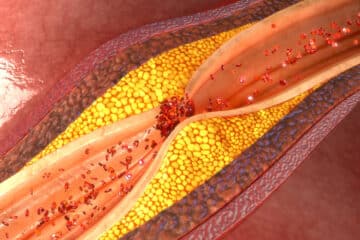
We need to focus on metabolic health, instead of focusing on the management of metabolic disease. From an Orthopedic Surgery perspective, our metabolic health has been shown to affect knee pain, osteoarthritis, and our rotator cuff. Really? Yes! The more we learn about various disease processes and their effects on us as a whole, the more important it becomes to actively manage our metabolic health. It’s time that we emphasize the importance of forks over knives… and our forks over our pills. Your knees, shoulder, low back, and hips will thank you.
This is why it is so important for us to take our overall health and wellness seriously as young as possible. Metabolic health is an AUC, or area under the curve issue. That simply means that the longer your tissues are exposed to the increase in lipid, inflammation, and other downstream effects of poor metabolic health the worse the effects on our body.
A recent article referenced below looked to determine what portion of the US population would be considered to be metabolically healthy.
Are You Metabolically Healthy?
It turns out that only 12% of Americans are considered metabolically healthy!
Why does an Orthopedic Surgeon and Sports Medicine professional talk about your metabolic health? Because if matters. Managing the health of athletes of all ages is challenging. My recent interests in metabolism are shaped by the recent literature showing just how important being in metabolic health is. This is why we always say that you can’t outrun, out-exercise or medicate away a bad diet. Our body’s processes are connected in ways we are only starting to understand.
Your metabolic health affects your risk of developing osteoarthritis. It’s true.. the mechanistic view of Orthopedic Health is not valid for the majority of issues that we deal with. Too many people… even Orthopedic Surgeons think that our joints wear out from mechanical wear or cumulative force. Granted, that does have a role, as does trauma, but given the epidemic of fatty liver disease and other metabolic diseases such as type 2 diabetes, our metabolic health may have a much bigger role than we think.
The prevalence of osteoarthritis is increasing… but we’re not becoming more active. So there must be something else that is leading to an increase in the risk of developing osteoarthritis and joint pain. Metabolic Syndrome, a collection of findings such as insulin resistance, hypertension, abdominal obesity, has been found to associate with a higher risk of developing osteoarthritis.
Metabolic Health and Orthopedic Surgery
Your metabolic health will also affect how much knee, hip or shoulder pain you experience once osteoarthritis has started. People with lipid (LDL, HDL, Triglyceride) abnormalities are at higher risk for certain tendon injuries too. Scientific studies have shown an association between rotator cuff tears and an abnormal lipid profile. Other papers found high cholesterol in patients with rotator cuff tears. Those authors recommended lipid studies for patients with rotator cuff tears.
I hope you are starting to see the connection between our metabolic health and our Orthopedic or Sports Medicine wellness. Granted, correcting your lipid profile isn’t going to reverse your arthritis, but it just might delay the onset of your next joint problem.
Inflammation is a trouble maker. It is one of the pillars of heart disease, and systemic inflammation can affect how you perceive pain. People with diabetes have more pain with Orthopedic issues than non-diabetics. People with elevated serum (blood) markers for inflammation have a higher chance of having pain due to osteoarthritis. This paper discussed the risks of having more inflammation and pain due to an abnormal lipid profile.
So, elevated cholesterol and LDL increase your risk for shoulder pain due to rotator cuff tears. Those abnormal lipids increase inflammation, and that will increase your pain. Certain people live very productive lives with osteoarthritis and have very little pain. Other people have mild arthritis yet they have severe pain. Perhaps our metabolic profile has a role in this. It certainly appears that it does.
This paper discussed how metabolic disease increases your risk of developing osteoarthritis
Far too often we use outward appearance or weight to view if someone appears healthy. That method doesn’t work.
What are the criteria for Metabolic Health?
Waist Circumference, < 102/88 cm in men/women
Systolic Blood Pressure, < 120 mmHG
Diastolic Blood Pressure, < 80 mmHG
Fasting Glucose < 100 mg/dL
HbA1c < 5.7%
Triglycerides < 150 mg/dL
HDL-C >= 40/50 mg/dL men/women
As we have tried to do over the last few months here, I have shown you data and scientific papers that are starting to reveal that almost all chronic disease shares a common cause –> metabolic dysfunction. The common cause of metabolic dysfunction is our diet.
Basically, the lower your waistline, pulse, blood pressure, triglycerides, and glucose the better chance you have at prolonging the time before the onset of chronic disease.
This is where the science of studying people who live to 100+ has brought us. These folks still die of cardiac disease, etc… they just do so 15-20 years later than everyone else. This is what we refer to as squaring off your lifespan curve. Now, many centenarians have a genetic advantage. Their genetic phenotype protects them. But we can achieve similar outcomes (maybe not living to 100) by being metabolically fit.
Being metabolically fit lowers your risk for the development of cardiac disease, cognitive decline (dementia), stroke, and cancer. As I said … many of these chronic diseases have a metabolic contribution. Certain habits – smoking, lack of exercise, stress, poor sleep also contribute.
How do you optimize for metabolic health?
You start with the results from the last visit to your doc. They likely obtained the lab tests mentioned. You can measure your waist.
The forces truly are against us. Drug companies do not benefit if you achieve metabolic fitness on your own without their pills. Big food is not our friend. Evolutionarily speaking we were not meant to have food available to us 24/7/365. Especially when that food is filled with substances that contribute to disease.
There is no magic diet. Different diets work for different people. The diet that works best for us is the one that we can sustain. Diets rich in real foods, including vegetables, fruit, lean meat, complex carbs, and grains appear to be best. The Mediterranean Diet is a good example.
Will “keto” work for you? I don’t know. And the online fanatics don’t know either. Will a low-carb diet work best for you? Maybe. A low-carb diet might be perfect, especially if you are diabetic. If you are diabetic you need to approach these diets with the help of your doctor.
Is the Paleo or meat-only diet safe? I don’t know the answer to that either. I am not going to listen to any online guru or talking head because they simply do not have the data to know which diet is best. Sadly those high-quality studies haven’t been done. I’m also not willing to dismiss the saturated fat / LDL./ cardiac disease theory which has a lot of data supporting it.
If you spend too long online you may want to debate that. I am not willing to roll those dice and bet my life on someone else’s unproven conjecture. Be careful what you read. Stick with real food, cook and prepare your own meals, and leave the food industry’s junk in the supermarket.
The journey has to start somewhere …. what will spark your lightbulb moment?
Make today the first day on your journey towards metabolic health… toss the crap in your kitchen, walk outside, let’s eat real food.
Who’s in?
Head to your kitchen with a big garage bag .. or two ;-)












Great article. I came to your website looking for an orthopedic doctor for a hip problem that flared up when I over-exercised beyond my level of conditioning, but as I’ve hobbled along the last few months, I’ve had the sneaking suspicion that my hip pain has just as much, if not more, to do with inflammation and lifestyle than the onset of the injury. Linking metabolic health to joint pain and arthritis seems spot on to me.
HI Sydney ..
Thank you very much for your comments!. We are very, very complex biological systems. We also have a tremendous ability to deal with metabolic stress (our 20’s, 30’s and 40’s ) before we start to show the hallmark signs of chronic disease and their effects. There is little doubt that metabolic health will prolong our healthspan. Our joints, muscles, and tendons will respond to systemic changes as well.
Thanks again for stopping by! You may want to check out the post from a few weeks back on the aging athlete.
I AM 67 YEARS OLD. I HAVE HAD TWO HIP REPLACEMENTS, TWO TOTAL SHOULDER REPLACEMENTS, AND CERVICAL FUSION FOR CERVICAL MYOPATHY. BY ALL MEASURES, I AM IN EXCELLENT PHYSICAL HEALTH; NO DIABETES, UNDERWEIGHT, LOW BLOOD PRESSURE,
ETC. ETC. YET SOMETHING IS EATING AWAY AT MY JOINTS AND THERE IS NOTHING I CAN DO TO STOP THIS. PERIOD.
IS IT A VIRUS? IS IT BIOCHEMICAL PROCESS FOR WHICH THERE IS NO CURE? OSTEOARTHRITIS… SUCH A GENERIC, EVIL TERM,
MEANINGLESS, IN FACT. FOR 27 YEARS MY JOINTS HAVE BEEN BREAKING DOWN WITH NO EXPLANATION WHATSOEVER.
BE THERE, THERE IS NO VIABLE SCIENTIFIC EXPLANATION FOR THE BREAKDOWN OR OUR JOINTS OR WE WOULD HAVE FOUND A CURE A LONG TIME AGO. PLEASE DO NOT GIVE PEOPLE FALSE HOPE.
I’m sorry to hear this Dianne… We do not know what causes many cases of arthritis. There are many factors involved which is why we have not found a cure. There are genetic issues, there are metabolic issues, environmental issues and a host of other very complicated changes which take place in our joints and lead to cartilage breakdown and loss. There are at least 3 new medications in various stages of development which will actually be able to treat the changes seen with osteoarthritis — but they will not be available for a few more years. I cannot imagine how frustrating this is for you. It frustrates us too. There are some factors that are in our control(which I discussed), and others, like genetics, that aren’t. Hopefully one day soon we will have a much clearer understanding and a much better list of treatments available.
Maybe Dianne should take a real good look at her diet. Ever since I changed mine I have NO more rashes, congestion or coughs. I feel better and that has helped me to continue to exercise regularly. I also have run into doctors that say I shouldn’t run with my osteoarthritis! That’s the complete opposite what should be prescribed! The more I sit the worse my pain is. The more I move the better I feel!!!
Keep up the great work Dr. Lukas!
Hello Howard
I can not say enough how impressed I am that an orthopaedic surgeon looks at the effects of diet and lifestyle as a major contributor to joint pathology. Many surgeons are focussed only on the joint and what surgery they can use to fix it. I am a specialist physiotherapist in the UK and have long felt that there is major link between what we eat and the conditions we present with. Our diets and the way our food is being produced must be having an impact on the way our bodies obtain the essential nutrients it needs for optimal function, repair and regeneration, but you are absolutely right that there is not enough robust evidence yet to back this up.
An important aspect of my consultation is now around weight & nutrition alongside physical activity and specific exercises.
Thank you Corinne ! it is incredible how just how profoundly our metabolism affects almost all processes. I’m also glad that we are not alone in pushing this new paradigm. :-)
Great article!!! As a fitness professional for the past 15+ years, who also suffered a traumatic knee injury. I can say with 100% certainty diet, exercise, stress, and sleep all play extremely vital roles in keeping joints healthy. The more I exercise and eat well, the less I feel my knee pain. The human body thrives on movement!!!!!
Thanks, Joseph ~!